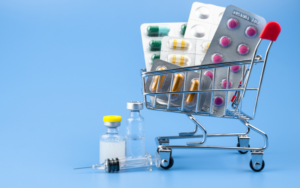
Still, for those living in England and needing regular prescriptions the costs can easily add up, so here are my tips to reduce that cost.
Free prescriptions
Free prescriptions are available to those in certain circumstances and for certain medications.
You normally won't have to pay for:
- medicines administered in a hospital or clinic (unless prescribed to take away)
- prescribed contraceptives
- certain sexually transmitted disease treatments
- medicines prescribed to treat tuberculosis and some mental health conditions
People in the following groups may receive a cut or reduction to the cost of prescriptions:
- under the age of 16 or over the age of 60
- in full-time education and aged 16-18 years old
- pregnant or had a baby in the last 12 months
- if you or your partner receive Income Support, Income Based Job Seekers Allowance, Universal Credit, Income-related Employment and Suport Allowance, or Pension Credit Guarantee Credit
- if you have a war pension exemption certificate
- if you have a valid Medical Exemption Certificate
Prepayment prescription certificates that reduce the cost of long-term medication
Those paying for regular prescriptions may benefit from purchasing an NHS prescription prepayment certificate (PPC) which covers all your charges for a set period.
- 3-month certificate costs £30.25 - cheaper if you have 4 or more prescriptions in the period
- 12-month certificate costs £108.10 - cheaper if you have 12 or more prescriptions in the period (you can pay 10 instalments by direct debit to spread the cost)
Application forms for an NHS prescription prepayment certificate can be collected from most Post Offices or major pharmacies or you can simply buy an online Prepayment Prescription Certificate.
If you choose to buy a prepayment prescriptions certificate, you can choose to:
- backdate it by up to 3 months while waiting for your PPC
- backdate it by up to a month for prescriptions you paid for before applying for your PPC
You will need to complete an FP57 form which is only available through your dispensing pharmacist. Also, if you become eligible for free prescriptions after buying a PPC, you can use the same form to request a refund on any unused time period covered by the certificate.
How to save money on over-the-counter, non-prescribed medications
Minor ailments can sometimes be treated through advice from a pharmacist who may dispense non-prescription medications without the hassle of seeing your GP. Before paying for your medication, it is always worthwhile asking the pharmacist if there is a cheaper equivalent available. Many non-prescription medications sold in pharmacies can carry higher price tags simply due to the brand and there could be a cheaper version of the same medication that could help you to save money - be sure to check with your pharmacist before selecting a different brand or version of the medication you need.
How does the NHS Minor Ailments Scheme reduce the cost of non-prescription medications?
If you are exempt from paying for prescriptions but need to buy non-prescription medications, you can get these free of charge if your GP surgery is registered for the NHS Minor Ailments Scheme. The scheme allows those who are exempt from prescription costs to access non-prescription medications for certain minor ailments that could include:
- Back-ache
- Colds
- Coughs
- Diarrhoea
- Hay fever
- Head lice
- Heartburn and indigestion
- Insect bites and stings
- Mild eczema and dermatitis
- Nappy rash
Extra tips for saving money on prescription medications
Some commonly prescribed medications can be purchased over the counter without a prescription. This can sometimes work out cheaper than the cost of a prescription, always ask your pharmacist. However, if your doctor has prescribed a large amount of drugs then it could still be cheaper under a prescription.
Private prescriptions
If you have attended a non-NHS doctor (maybe for emergency diagnosis or as part of a scheme) or have requested drugs not supplied by the NHS any prescription will be charged at the full cost of the drugs. In this case, it would be advisable to shop around rather than assume costs will be the same everywhere. Major supermarkets and online pharmacies often have the cheapest deals.





